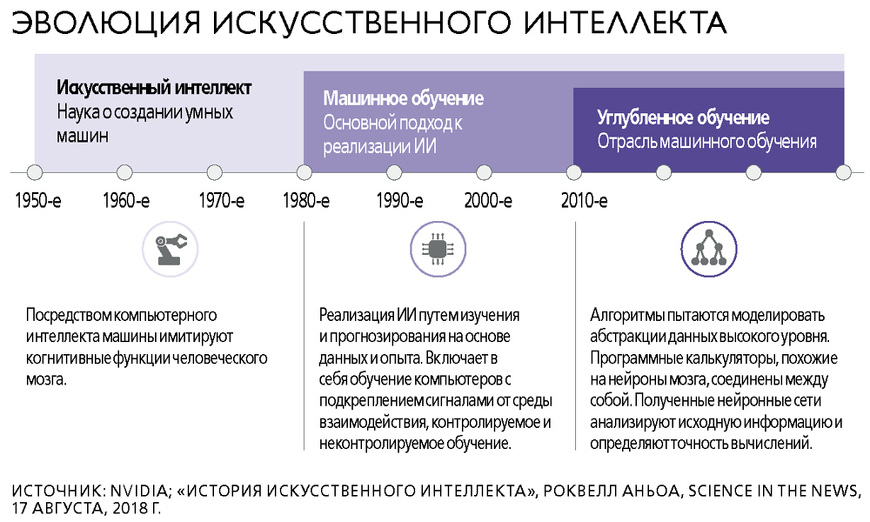Thanks to this, the insurance sector will dramatically change, moving from the current state of "find and fix" to "predict and prevent." By gaining experience of technology use, the pace of change will also be accelerated by insurance agents, brokers, consumers, financial intermediaries and suppliers.
Four vectors
1. Growth of data from network devices
According to McKinsey analysis, in the next 10 years, the insurance will be influenced by four major technological trends closely or directly related to AI.
The sensor equipment has been used in production for a long time, but there will be a significant increase in the number of network devices for consumers in the coming years. To the already existing autonomous cars, fitness trackers, smart appliances, smartphones and smart watches the new growing categories of devices such as clothing, glasses, medical gadgets and shoes will join.
The avalanche of data received from them will allow insurers to better understand their customers, which will lead to the emergence of new insurance products, more personalized pricing policies and ultimately to providing services in real time. For example, an instrument connected to an actuarial database worn by a customer (a bracelet, a piece of clothing) can evaluate a personal risk based on daily routine, as well as the likelihood and seriousness of potential incidents.
2. Development of Robotics
Additive production, also known as 3D printing, will radically change insurance products of the future, as in 2025 the buildings created this way will be everywhere. Programmed autonomous drones, cars and agricultural equipment, advanced surgical robots will also become commercially viable in the next decade. By 2030, the share of autonomous vehicles might exceed 25% (according to the World Economic Forum forecast). The growing presence of robotics in different areas of everyday life will shift the risk zones and influence the expectations of customers.
3. Data Ecosystems
Soon, public and private organizations are likely to join forces in creating data exchange ecosystems for multi-purpose use in various industries. In the framework of a unified regulatory framework for cyber security, standard protocols with open source will appear. Data from personal portable gadgets will be sent directly to insurance companies, and data from connected home and car devices will be available through Amazon, Apple, and Google.
4. Achievements in cognitive technologies
Cognitive technologies based on the ability of human brain to learn through case analysis and subsequent conclusion will be handling data processing. Due to expansion of such technology commercialization (today used mainly for image recognition, voice and text processing), insurers will have access to business models that are updated in real time, adapting to the world.
The future is close
McKinsey experts also made an approximate scenario of how the insurance cost chain will be transformed by 2030.
First of all, the time needed to purchase insurance will be shortened. AI algorithms will provide the company with sufficient information about the customer, so that a personalized offer for life or car insurance can be made in a few minutes. The smart blockchain contracts with instant transactions from the client's financial account will also be of help.
The main activity of insurance companies in 2030 will be the processing of claims, but the number of personnel responsible for this will be reduced by 70-90% compared to the current year. Claims for personal insurance and small business insurance will in most cases be automated, which will increase the efficiency of processing applications to 90%. Insurance will pass from the "purchase and annual renewal" model to a continuous cycle, as the product offers will be constantly adapting to human behavior. "Micro-coverage" (for example, accumulator battery insurance, or flight delay insurance) will become popular, which consumers can customize to meet specific needs by instantly comparing the prices of different insurers. A wide range of types of insurance is determined by the changing nature of basic services. Thus, physical assets are often distributed among several parties today. Striking examples are joint trips by Uber and a platform like Airbnb, where the company provides a service and users sell their products.
The first notification of the incident will automatically occur. So, in case of a car accident, the insured will record the video of the damage. It will convert into the loss description, and the system will quickly estimate the amount. Autonomous cars with minor damage will be able to go to the service center. In the meantime, another car will be sent to the customer as a temporary replacement. In homes, AI devices will be used more often to actively monitor water level, temperature and other key risk factors to warn both residents and insurers about problems before they occur. Insurance organizations have to precisely work on prevention and mitigation of risks in the ideal scenario in the nearest future.
Source: https://forbes.kz/finances/insurance/umnyiy_strahovschik_1531481976/





